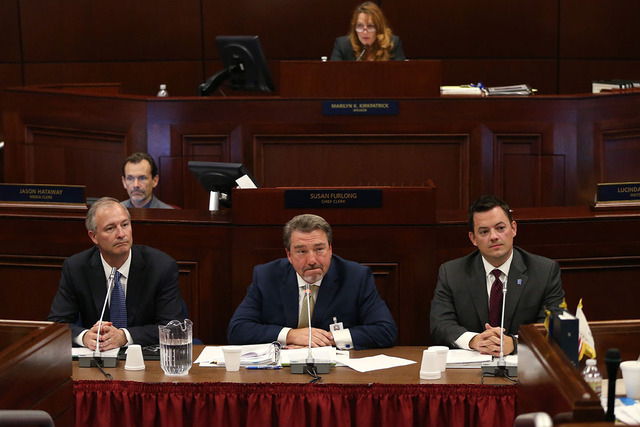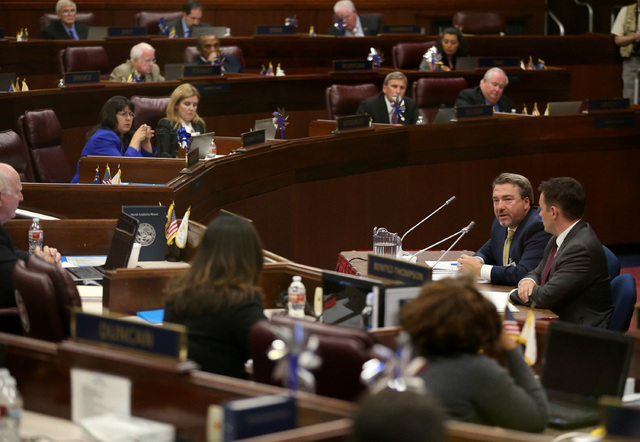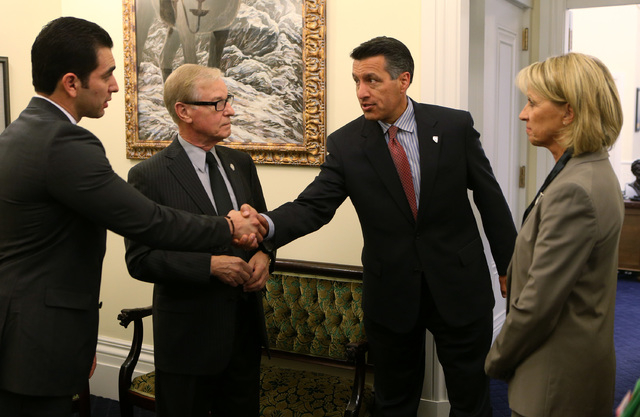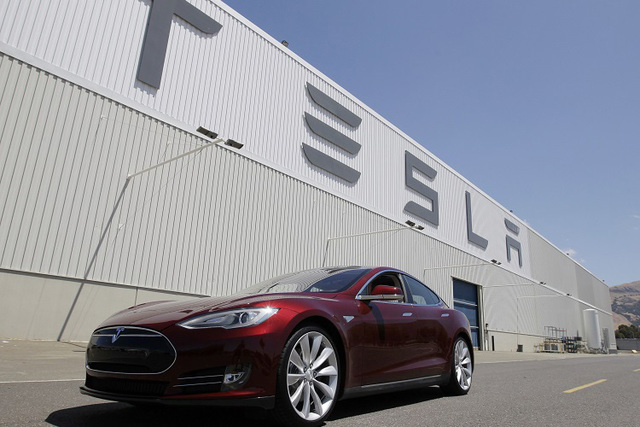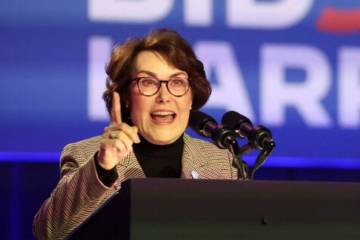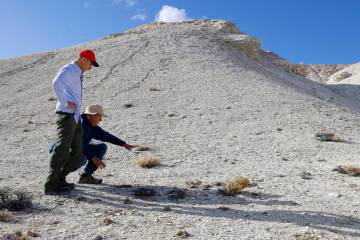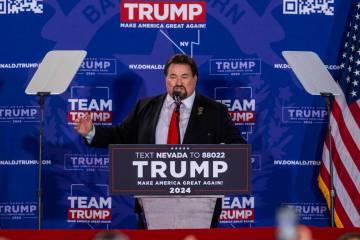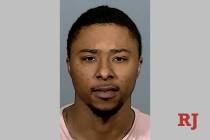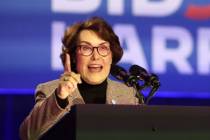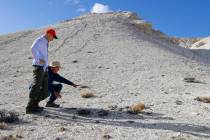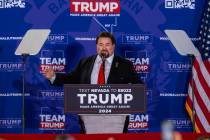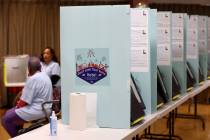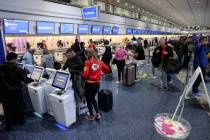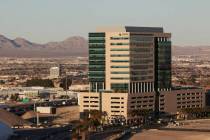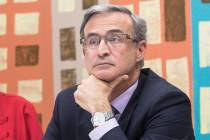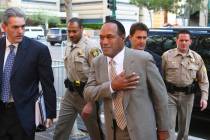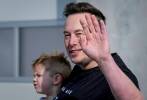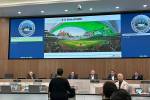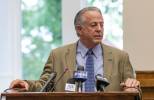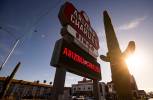Governor signs Tesla bills approved by Nevada Legislature
CARSON CITY — Despite questions raised by state lawmakers about the costs and benefits of a $1.3 billion tax incentive package proposed by Gov. Brian Sandoval to bring Tesla to Nevada, four bills to deliver the electric car maker’s battery plant to the Silver State won unanimous approval at a special legislative session that ended late Thursday.
Sandoval signed the measures into law later in the evening, bringing closure to a public process that began last week when Nevada officials said the state had won the coveted project over Texas, California, New Mexico and Arizona. State officials had worked to lure Tesla to Nevada for months. U.S. Sen. Harry Reid was also praised for his work in getting the project.
“Isn’t this a great day for Nevada? This is as big as it gets,” Sandoval said.
The project was described during the two-day session as a history-changing event for Nevada, setting the state on a path to economic diversification. Tesla last week announced it had selected Nevada for the location of its $5 billion battery plant east of Reno that will employ an estimated 6,500 workers by 2018.
Assemblyman Ira Hansen, R-Sparks, called the Tesla deal a monumental change for the state and the biggest economic development project since construction of the Hoover Dam.
Elon Musk, chairman and CEO of California-based Tesla Motors, said last week the incentive package offered by Nevada was not the most lucrative, nor was it the only reason to pick the state for the Gigafactory.
“What the people of Nevada created is a state where you can; where you are very agile, where you can do things quickly and get things done,” he said. “It’s a real get-things-done state. That was a very important part of the decision.”
Musk said the Gigafactory is a vital piece of the company’s plans to build a mass-market affordable electric car, which he said is projected for release in about three years.
The end of the special session to finalize the Tesla deal became certain after the Senate unanimously approved Senate Bill 1 with some minor amendments. The Assembly then held a hearing and followed suit on the major incentives bill, passing the measure 39-0.
There were similar unanimous votes for three other measures. Assembly Bill 1, which would give the company a small break on its utility costs, Assembly Bill 2, which will allow the company to sell its cars in Nevada without a franchise agreement, and Assembly Bill 3, which will redirect most of a home office tax credit for insurance companies to the Tesla deal.
The bills were passed without any testimony from Tesla executives.
Lawmakers spent much of the day Thursday asking myriad questions about the tax deal that would essentially see no state or local taxes collected from the company for 10 years. Some of the tax breaks would extend for 20 years.
Lawmakers asked state officials how the incentive package would be monitored to ensure that requirements to hire local workers and contractors will be complied with by the company, which wants the battery plant to help in its plans to develop a mass-market all-electric car.
And, for a question that might be on the minds of many Southern Nevada residents, Democratic Sen. Ruben Kihuen asked what is in the effort that will help his constituents in Las Vegas.
The questions came as the Senate met as a Committee of the Whole to consider SB1, the major tax break legislation that requires the company to make a $3.5 billion investment in Nevada over 10 years to receive the incentives.
The focus at the special session shifted from the Assembly, which heard three of the more minor bills related to the Tesla deal on Wednesday, to the Senate, where SB1 was introduced late Wednesday after all-day closed-door negotiations and discussions.
An effort by some Democratic members of the Senate to preserve an $80 million film tax credit program was part of the reason for the delay. Ultimately, the bill as introduced will transfer $70 million of the transferable tax credits to the Tesla deal.
Sen. Kelvin Atkinson, D-North Las Vegas, asked why the Tesla project had to come at the expense of the film tax credit program approved in the 2013 session. The program benefits Southern Nevada where there is a big need for jobs as well, he said.
“It just appears to me we are picking losers and winners here,” Atkinson said.
Steve Hill, executive director of the Governors Office on Economic Development, said the film tax credit program has expended a little more than $5 million, and the remaining amount is expected to last through the 2015 legislative session, when a further discussion can occur regarding the future of the program.
Chris Nielsen, executive director of the state Department of Taxation, told the Senate that the requirement that 50 percent of the 6,500 workers at the Gigafactory and 50 percent of the estimated 3,000 construction workers on the project be Nevada residents will be monitored closely.
A Nevada driver’s license and other proofs will be required to ensure compliance with the provisions, which several state lawmakers said were crucial to finalizing any deal with Tesla, he said.
The hiring requirements, which do include waivers for job classifications that Tesla can’t fill as it ramps up the project, are tied to the tax abatements and credits that are part of the agreement, he said.
There will be an annual compliance audit of the entire project to ensure that all the conditions are being met or the state will be able to “claw back” any abatements or credits, Nielsen said.
Hill said he fully expects there to be some waivers to the Nevada hiring requirements as the company expands in four years to 6,500 workers. But state officials will work with Tesla on workforce development.
Hill also said any waivers will be disclosed by his office on the agency website as such agreements are finalized with Tesla.
The amendment to SB1 includes assurances that workers on the construction of the plant will get health insurance. It also provides more transparency for any waivers of the Nevada hiring requirements.
As for the benefit to Southern Nevada, Hill said the impact will be regional initially as the 5-million-square-foot plant is built at the Reno-Tahoe Industrial Park in Storey County.
But the “brand” opportunities that will come to Nevada from the decision of Tesla to locate here will be felt across the state, he said.
Sen. Mark Manendo, D-Las Vegas, asked whether the $100 million or more cost of completing a new road between Interstate 80 and U.S. Highway 50 to benefit the Tesla project would hurt Southern Nevada road improvements such as Project Neon to widen Interstate 15. The region has been shortchanged in the past, he said.
Rudy Malfabon, director of the state Department of Transportation, said Southern Nevada improvements will not be affected by the USA Parkway effort, which has been on the agency’s list of projects for several years.
The major bill would provide state and local tax breaks, including for sales taxes for 20 years. Also, Tesla wouldn’t have to pay the modified business tax or the personal and property tax for 10 years. The tax abatements could add up to $1.1 billion, depending on how much construction material Tesla buys, for example.
Tax credits bring the total to as much as $1.3 billion. The road project would add another $100 million or more to the total cost of the deal.
An independent analysis of the deal says that Tesla could generate an estimated $1.95 billion in direct and indirect tax revenues to state and local governments in Nevada over 20 years under the most likely scenario.
RELATED:
Sandoval issues proclamation, calls special session for Tesla deal
Nevada’s share of Tesla plant could hit $1.3 billion



